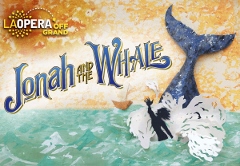A FISHY MONSTROSITY
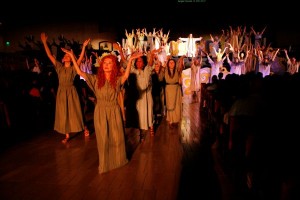 What is it about the story of Jonah that has so captured the world’s imagination? Is it the stupidity of a man trying to run away from God, as if that were even possible? Is it the preposterous idea of a man living for three days inside a whale? Or perhaps it is the revolutionary belief that repentance leads to mercy and forgiveness, in this case, the sparing of a great city from destruction? The genius of the biblical book of Jonah is that it can be read on so many different levels, appealing simultaneously to children and adults. Sounds like a firm basis on which to build a community opera, especially one staged inside a cathedral, right?
What is it about the story of Jonah that has so captured the world’s imagination? Is it the stupidity of a man trying to run away from God, as if that were even possible? Is it the preposterous idea of a man living for three days inside a whale? Or perhaps it is the revolutionary belief that repentance leads to mercy and forgiveness, in this case, the sparing of a great city from destruction? The genius of the biblical book of Jonah is that it can be read on so many different levels, appealing simultaneously to children and adults. Sounds like a firm basis on which to build a community opera, especially one staged inside a cathedral, right?
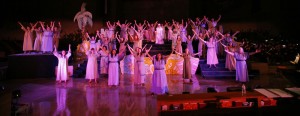 For the last eight years during Lent, LA Opera has partnered with a multitude of community organizations to stage a massive production at the Cathedral of Our Lady of the Angels. Every other year, Benjamin Britten’s Noye’s Fludde has been performed. For 2014, a brand new opera was commissioned. Simply titled Jonah and the Whale, it received a world premiere of epic proportions. Now that it has been staged, it should be consigned to the dustbin, as it fails on so many different levels.
For the last eight years during Lent, LA Opera has partnered with a multitude of community organizations to stage a massive production at the Cathedral of Our Lady of the Angels. Every other year, Benjamin Britten’s Noye’s Fludde has been performed. For 2014, a brand new opera was commissioned. Simply titled Jonah and the Whale, it received a world premiere of epic proportions. Now that it has been staged, it should be consigned to the dustbin, as it fails on so many different levels.
 Although the biblical book of Jonah comprises just four short chapters, it contains more than enough drama to flesh out an opera. Yet, librettist Velina Hasu Houston has not only fabricated completely new aspects of the story, but distorted the overall shape of it. Most glaringly, she has given Jonah a fiancée named Sarah who was taken captive by the Assyrians to Nineveh. Thus, when Jonah arrives in Nineveh to deliver God’s message, he is reunited with Sarah, thereby transforming this tale of a wayward prophet into a love story. Instead of delivering a message of doom and destruction, this Jonah preaches love and forgiveness. Unlike the biblical Jonah, he does not get angry when God relents and spares Nineveh from destruction. No, he is a decidedly more generous and likeable character.
Although the biblical book of Jonah comprises just four short chapters, it contains more than enough drama to flesh out an opera. Yet, librettist Velina Hasu Houston has not only fabricated completely new aspects of the story, but distorted the overall shape of it. Most glaringly, she has given Jonah a fiancée named Sarah who was taken captive by the Assyrians to Nineveh. Thus, when Jonah arrives in Nineveh to deliver God’s message, he is reunited with Sarah, thereby transforming this tale of a wayward prophet into a love story. Instead of delivering a message of doom and destruction, this Jonah preaches love and forgiveness. Unlike the biblical Jonah, he does not get angry when God relents and spares Nineveh from destruction. No, he is a decidedly more generous and likeable character.
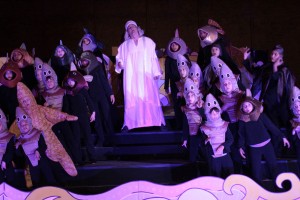 What is perhaps most disappointing about Houston’s libretto is that she reduces the drama of the biblical text rather than heightens it. In Scripture, for example, Jonah repents only after being nearly drowned at sea and swallowed by a whale. From that inauspicious location, he prays to God. It is a beautiful and poetic prayer with a long liturgical tradition of song behind it. Jonah’s prayer would have made a superb aria. Instead, it is replaced by the presence of little fish played by cute children who convince Jonah to repent.
What is perhaps most disappointing about Houston’s libretto is that she reduces the drama of the biblical text rather than heightens it. In Scripture, for example, Jonah repents only after being nearly drowned at sea and swallowed by a whale. From that inauspicious location, he prays to God. It is a beautiful and poetic prayer with a long liturgical tradition of song behind it. Jonah’s prayer would have made a superb aria. Instead, it is replaced by the presence of little fish played by cute children who convince Jonah to repent.
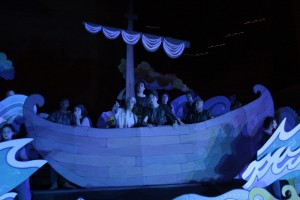 The only true songs within the opera take the form of congregational hymns. Before the performance began, Conductor James Conlon spent nearly fifteen minutes rehearsing the audience in their parts. There are five such hymns interspersed throughout the opera, which feature new verses written to two well-known tunes. These were the only parts of Jack Perla’s score with any recognizable tonality. Yet even these were made discordant by the overabundant layering of voices and instruments. The remainder of the score was uncomfortably free of melodic and harmonic anchoring’”dissonant through and through. In fact, the score was so difficult that most of the amateur musicians and singers struggled to make sense of it, and many of the younger ones clearly gave up.
The only true songs within the opera take the form of congregational hymns. Before the performance began, Conductor James Conlon spent nearly fifteen minutes rehearsing the audience in their parts. There are five such hymns interspersed throughout the opera, which feature new verses written to two well-known tunes. These were the only parts of Jack Perla’s score with any recognizable tonality. Yet even these were made discordant by the overabundant layering of voices and instruments. The remainder of the score was uncomfortably free of melodic and harmonic anchoring’”dissonant through and through. In fact, the score was so difficult that most of the amateur musicians and singers struggled to make sense of it, and many of the younger ones clearly gave up.
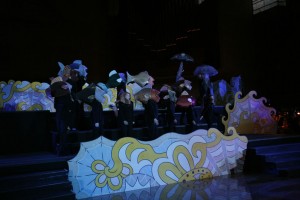 For a community production, Jonah and the Whale relied all too heavily on its professional participants. Of these, the four principal soloists performed admirably: tenor Matthew O’Neill as Jonah, mezzo-soprano Cassandra Zoe Velasco as Margalit (Jonah’s mother), soprano Hae Ji Chang as Sarah, and bass Valentin Anikin as Captain Mordecai. Chang stood out above all for her expressiveness, which she showed through bodily movement and dynamic variation. Too often, the soloists sang uniformly loud and, within Eli Villanueva’s traffic cop direction, simply stood still. The latter is largely due to Carolina Angulo’s steeply-stepped stage, which rendered difficult any movement forward or backward. Even with sound designer Jon Gottlieb on hand, most of the production was deafeningly loud’”the result of poor musical scoring and too many participants.
For a community production, Jonah and the Whale relied all too heavily on its professional participants. Of these, the four principal soloists performed admirably: tenor Matthew O’Neill as Jonah, mezzo-soprano Cassandra Zoe Velasco as Margalit (Jonah’s mother), soprano Hae Ji Chang as Sarah, and bass Valentin Anikin as Captain Mordecai. Chang stood out above all for her expressiveness, which she showed through bodily movement and dynamic variation. Too often, the soloists sang uniformly loud and, within Eli Villanueva’s traffic cop direction, simply stood still. The latter is largely due to Carolina Angulo’s steeply-stepped stage, which rendered difficult any movement forward or backward. Even with sound designer Jon Gottlieb on hand, most of the production was deafeningly loud’”the result of poor musical scoring and too many participants.
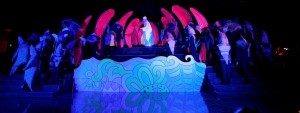 The thousands in the pews watching this community spectacle appear to have most appreciated seeing their friends and family onstage. They also delighted in Paula Higgins’ often colorful and creative costumes, such as jellyfish made from umbrellas or fish that looked like pool floats. As in a liturgical procession or holiday parade, the actors vivified the performance by dancing up and down the central aisle. But this was not enough to make the production a success.
The thousands in the pews watching this community spectacle appear to have most appreciated seeing their friends and family onstage. They also delighted in Paula Higgins’ often colorful and creative costumes, such as jellyfish made from umbrellas or fish that looked like pool floats. As in a liturgical procession or holiday parade, the actors vivified the performance by dancing up and down the central aisle. But this was not enough to make the production a success.
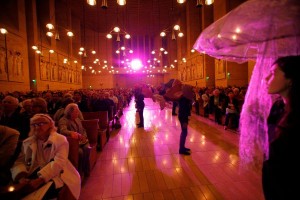 Under the auspice of LA Opera Off Grand, this world premiere of Jonah and the Whale could have been much improved by heeding the adage “less is more.” Instead, anyone and everyone were invited to participate, resulting in a noisy and unwieldy production. As if that weren’t enough, the raw materials were deficient: a libretto lacking truth and a score lacking beauty. Were it not for the hired professionals, this community production would never have gotten off the ground. Next time LA Opera commissions a new work, it ought to ensure that the result is accessible. This Jonah and the Whale deserves to drown in Noye’s Fludde and never return.
Under the auspice of LA Opera Off Grand, this world premiere of Jonah and the Whale could have been much improved by heeding the adage “less is more.” Instead, anyone and everyone were invited to participate, resulting in a noisy and unwieldy production. As if that weren’t enough, the raw materials were deficient: a libretto lacking truth and a score lacking beauty. Were it not for the hired professionals, this community production would never have gotten off the ground. Next time LA Opera commissions a new work, it ought to ensure that the result is accessible. This Jonah and the Whale deserves to drown in Noye’s Fludde and never return.
Jonah and the Whale
Los Angeles Opera
Cathedral of our Lady of the Angels
555 West Temple Street
played March 21 & 22, 2014
for future LA Opera events, call 213.972.8001
or visit www.LAOpera.com
